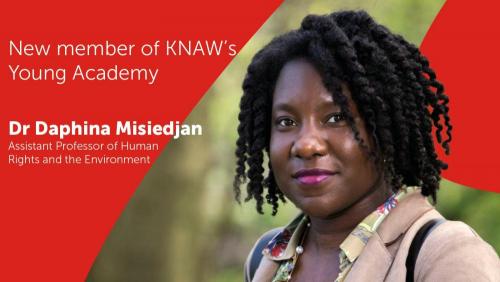
https://www.iss.nl/en/news/its-very-special-realize-my-research-really-m...
Daphina Misiedjan has been elected a member of the Young Academy of the KNAW. She is a lawyer and researcher at Erasmus University Rotterdam at the International Institute for Social Studies (ISS). The instalment is on March 28, 2023 and is for a period of five years. Misiedjan does research on climate inequality: "I do research on the challenges that vulnerable groups face."
Can you explain what climate inequality is?
"The richest countries and the companies that contribute the most to climate change are often much less affected. Countries in the global south experience the impact first. Think of extreme droughts or heavy floods. In Yemen, for example, access to water is increasingly at risk, but that country's CO2 emissions are very limited. Even within countries, you see big differences. For example, it is usually people with higher incomes who contribute more to climate change, but people with lower incomes suffer more."
Does climate inequality also exist in the Netherlands?
"Certainly, think of the extreme heat that is increasingly common in summer. People with lower incomes have smaller houses, and usually have less access to public green space in the area to cool off. As a result, they are more likely to suffer from heat stress. You also see that this group has less access to subsidies, for example, to better insulate the home."
Where does your interest in climate inequality come from?
"As a lawyer, I look at rights, regulation and distribution issues that are also determined by legislation. My dissertation was about access to drinking water from a human rights perspective. The international human rights movement emerged just after World War II, but climate was a blind spot for a long time. Only since the 1970s people started realizing that our planet is running into limits. Now the question is how human rights can continue to be safeguarded as we face ever-increasing environmental and climate issues."
"I want to try to help vulnerable groups empower themselves more. There are more and more lawsuits to protect vulnerable groups. I think that's a very interesting development. For example, the lawsuit by Friends of the Earth against Shell for pollution in Nigeria or the Urgenda case in the Netherlands. So law can do good, but it also has a downside because it has also played a role in the current distribution of capital."
What do you hope to accomplish with your research?
"Initially, I want to expose the role of law. I also think it's important to do research on topics that really affect people. Possibly my findings can help formulate legal cases. As a researcher, I have more time to dig into something than someone working at an NGO. Parties or individuals can come to me with questions. If I have time, I can get people started and provide information."
How does that go? Do people approach you?
"That happens regularly, for example, after people have read an interview with me or when they came to a lecture. Recently someone asked if a forest area near him that is in danger of being cut down could be protected with 'Rights of Nature'. It is special to notice that my research is alive and relevant to people. I can't always answer, but try to help them where I can. For example, I share links to research or refer to organizations that can help. ISS values social impact and you get to make space for that as well."
What does it mean to be part of the Young Academy?
"It's very valuable to connect with researchers from other fields and see how we can complement each other. I also really enjoy being able to help think about science policy and how it affects us as young researchers. For example, about the criteria the NWO (Nederlandse Organisatie voor Wetenschappelijk Onderzoek) should use when awarding grants. How can we give social impact more weight in research funding? These are questions we are thinking about. We can also contribute to the research agenda and set up our own research. For example, during the pandemic, research was done on the impact of Covid-19 on young researchers."
What would you like to put on the agenda?
"I find it interesting to see how we can connect society and science more, especially for children. That's why the Lil'Scientist programme appeals to me. They involve children in research by letting them collect data themselves. I would also love to see a Kingdom-wide network for researchers. At first, researchers from the Caribbean islands were not always eligible for NWO grants and until recently were also not eligible for election to the KNAW. Fortunately, this is now possible. I would like to help set up this network."
- Assistant professor










Add new comment